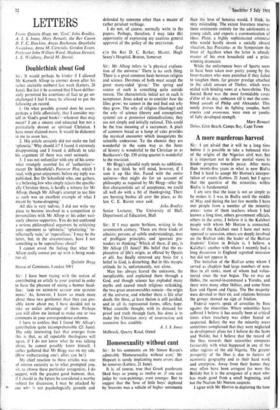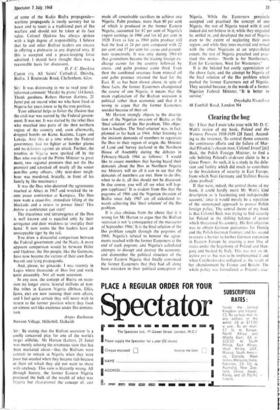A more murderous harvest
Sir: I am afraid that it will be a long -time before it is possible to take a balanced View of the origins of the Nigerian civil war, 'but it is important not to allow partial views' to hinder progress towards peace. After niore than twenty-five years in what is now Biafra I find it hard to accept Mr Horton's interpre- tation of events (Letters, 21 June), but I agree that the question of the minorities within Biafra is fundamental.
I am sure that the issue is not so simple as he makes it. I was in Biafra until the middle of May and during the last few months I have met people from a number of the minority areas : some of them teachers whom I had known a long time, others government officials, others in the army. I believe it is the Kalahari people with whom Mr Horton is connected. Some of the Kalahari men I have met were opposed to secession, others are deeply involved on the Biafran side; the leader of the Biafran Students' Union in Britain is, I believe, a Kalabari; another with whom I recently had a long discussion in England regretted secession but did not oppose it.
The battalion of the Biafran army whom I served as chaplain had large numbers of non- Ibos in all ranks, most of whom had volun- teered since the war began. The co was an Ibibio, the second-in-command a Yoruba, and there were many other [bibios, and some from Ijaw and Ogoni and Ogoja. The Ibo majority were devoted to their co. and relations between the groups •showed no sign of friction.
Federal reports speak of atrocities by Ibos against the minorities. Where minorities have suffered I believe it has usually been at critical times when treachery was either feared or suspected. Before the war the minority areas sometimes complained that they were neglected in development plans (so I believe do the Scots and Welsh), but I believe that the record of the Ibos towards their minorities compares favourably with what happened in any of the other regions of the old Nigeria. The greater prosperity of the Ibos is due to factors of - economic geography and to their hard work and enterprise. Away from their homes they may often have been arrogant (so were the British) but it is the arrogance of a man who has made good from a small beginning, and not the'Nazism Mr Norton suspects.
I agree with Mr Horton in deploring the tone of some of the Radio Biafra propaganda— wartime propaganda is rarely savoury but to boast and to taunt is a traditional part of Ibo warfare and should not be taken at its face value. Colonel Ojukwu has always spoken with a high degree of responsibility. I believe that he and other Biafran leaders are sincere in offering a plebiscite in any disputed area. If this is accepted and a peace-keeping force admitted, I should have thought there was a reasonable basis for discussion.
D. F. C. Hawkins Canon i/c, All Saints' Cathedral, Onitsha, Biafra. 3 Bournside Road, Cheltenham, Glos.











































 Previous page
Previous page